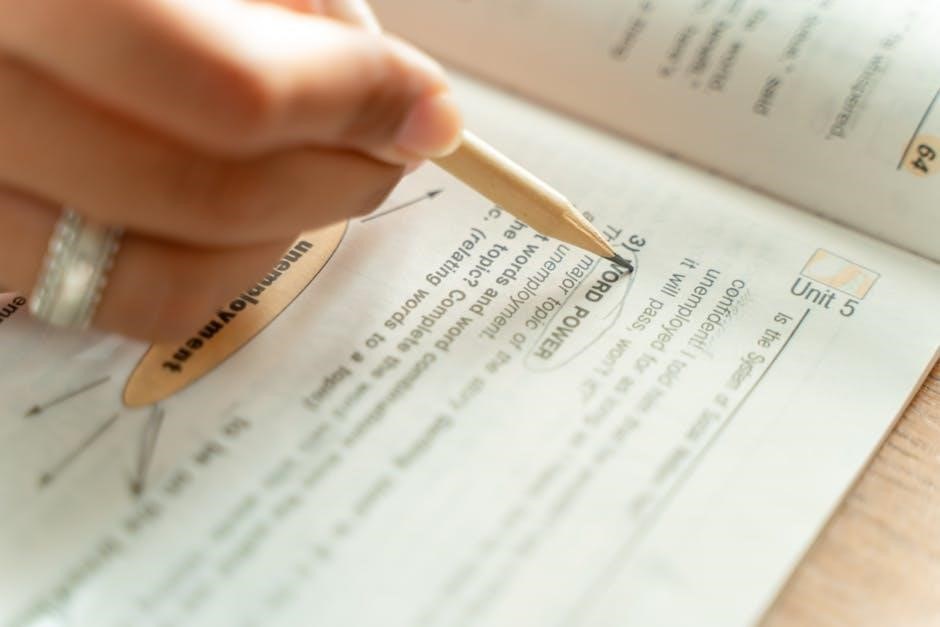A comprehensive paralegal exam study guide is essential for success, covering key topics like legal ethics, exam format, and practice questions to ensure thorough preparation.
Overview of the Paralegal Exam
The paralegal exam is a critical assessment for individuals seeking to demonstrate their expertise in legal practices. It evaluates knowledge of legal ethics, procedures, and substantive law. The exam typically includes multiple-choice questions and practical tasks to test comprehension and application of legal concepts. Eligibility requirements vary, but candidates often need formal education or work experience in the legal field. The exam covers key areas such as contracts, torts, and evidence, ensuring paralegals are prepared to assist attorneys effectively. Passing the exam validates a paralegal’s skills and enhances career opportunities in law firms, corporate legal departments, or government agencies.
Importance of a Study Guide for Preparation
A study guide is indispensable for paralegal exam preparation, offering structured content aligned with exam topics. It provides detailed explanations of legal concepts, practice questions, and test-taking strategies. Utilizing a study guide ensures thorough understanding of key areas like legal ethics and procedural law. It also helps identify knowledge gaps, allowing focused study. Regular practice with included questions enhances familiarity with exam format and timing. A well-organized study guide reduces study time, boosts confidence, and improves performance. By simulating real exam conditions, it prepares candidates for the challenges they’ll face, ensuring they’re well-equipped to succeed.

Understanding the Paralegal Exam
The paralegal exam assesses knowledge of legal procedures, ethics, and terminology. It covers key areas like civil litigation, corporate law, and legal research, ensuring competency for professional roles.
Exam Format and Structure
The paralegal exam typically consists of multiple-choice questions, assessing knowledge of legal procedures, ethics, and terminology. It may include sections on civil litigation, corporate law, and legal research. Time limits are strictly enforced, requiring efficient problem-solving skills. The exam evaluates critical thinking and the ability to apply legal concepts to real-world scenarios. Understanding the format is crucial for effective preparation and time management during the test. The structure ensures a comprehensive assessment of a paralegal’s competency in key areas of legal practice.
Eligibility Requirements for the Exam
The eligibility requirements for the paralegal exam typically include completing an approved paralegal education program, such as an associate’s degree or certificate in paralegal studies. Some exams may also require a bachelor’s degree in any field with additional paralegal-specific coursework. Work experience in a legal setting may substitute for formal education in certain cases. Applicants must usually be at least 18 years old and may need to complete an internship or accumulate a specific number of credit hours in law-related subjects; Requirements can vary by certifying organization and state, so it’s essential to verify the criteria for the specific exam you plan to take. Ensuring all prerequisites are met is crucial before registering for the exam.
Key Topics Covered on the Exam
The paralegal exam typically covers a wide range of legal topics to assess a candidate’s knowledge and skills. Core subjects include legal ethics, civil procedure, contracts, evidence, and family law. Additionally, the exam may test understanding of criminal law, real estate transactions, and corporate law. Many questions focus on legal research and writing, as well as the practical application of legal principles. The exam also evaluates familiarity with court procedures, document preparation, and time management skills. Some sections may include scenario-based questions to simulate real-world legal scenarios. A strong grasp of legal terminology and the ability to analyze case law are also essential. Preparation should emphasize both theoretical knowledge and practical problem-solving abilities to ensure success on the exam.

Choosing the Right Study Guide
Selecting a study guide tailored to the paralegal exam ensures comprehensive coverage of legal ethics, procedures, and practical scenarios, enhancing exam readiness and understanding of key concepts effectively.
How to Select a Comprehensive Study Guide
Selecting the right study guide involves evaluating its coverage of legal ethics, exam format, and practice questions. Ensure it includes up-to-date content, clear explanations, and practical examples. Look for guides that align with the exam syllabus, offering detailed insights into key topics like civil procedure, contracts, and evidence. A good guide should also provide sample questions and mock exams to simulate test conditions. Additionally, check for reviews or recommendations from legal professionals or successful exam takers. A well-structured guide with accessible language and organizational tools, such as timelines or flashcards, can enhance your study experience. Prioritize guides that balance theoretical knowledge with practical application to ensure thorough preparation for the paralegal exam.
Features to Look for in a Study Guide
A reliable paralegal exam study guide should include comprehensive coverage of legal ethics, exam format details, and practice questions. Look for guides that offer clear explanations of key concepts, such as civil procedure, contracts, and evidence. Additional features like sample multiple-choice questions, mock exams, and practical tasks can enhance preparation. Ensure the guide is updated with the latest legal standards and includes templates or tools for organizing study materials. A well-structured guide with accessible language and logical organization will help you stay focused. Prioritize guides that provide detailed answers and explanations for practice questions, allowing you to understand your strengths and areas for improvement. These features collectively ensure a thorough and effective study experience.

Effective Exam Preparation Strategies
Develop a structured study plan, utilize active learning techniques, and manage time efficiently. Regular practice exams and consistent review are key to achieving exam success and confidence.
Creating a Study Plan and Schedule
A well-structured study plan is crucial for effective exam preparation. Start by breaking down the exam syllabus into manageable sections and allocate specific time slots for each topic. Set realistic daily and weekly goals, ensuring consistent progress without overloading. Incorporate resources like practice exams and legal ethics questions to reinforce understanding. Use a paralegal time sheet template to track study hours and stay organized. Regularly review and adjust the plan based on progress and identify areas needing more attention. Flexibility is key to maintaining motivation and ensuring comprehensive preparation. By adhering to a structured schedule, candidates can efficiently cover all necessary material and build confidence for the exam.

Active Learning Techniques for Better Retention
Active learning enhances retention by engaging candidates in hands-on activities. Techniques include self-testing with practice exams, summarizing key concepts, and teaching the material to others. Flashcards can help memorize legal terms and procedures. Engaging in discussions or study groups fosters deeper understanding. Applying knowledge through practical exercises, such as drafting legal documents or analyzing case studies, reinforces learning. Regular review of notes and practice questions ensures long-term retention. Incorporating these methods into a study routine complements traditional reading and note-taking, making preparation more dynamic and effective. By actively participating in the learning process, candidates can better grasp complex legal concepts and retain information for the exam.
Time Management During Study Sessions
Effective time management is crucial for successful exam preparation; Allocate specific time slots for each subject, focusing on areas needing improvement. Use timers or calendars to track progress. Break study sessions into manageable intervals, such as 50-minute study periods followed by 10-minute breaks, to maintain focus. Prioritize challenging topics early when mental energy is highest. Avoid multitasking to ensure concentration. Set realistic daily goals and review progress regularly. Utilize a planner or digital tool to organize tasks and deadlines. By managing time efficiently, candidates can cover all necessary materials without feeling overwhelmed, ensuring a balanced and productive study routine. Consistency is key to achieving exam success.

The Role of Practice Exams
Practice exams simulate real test conditions, helping candidates identify weaknesses, improve time management, and build confidence. They are indispensable for assessing readiness and refining strategies effectively.
How to Use Practice Exams Effectively
Practice exams are a powerful tool for exam preparation. Start by simulating real test conditions, including time limits and format. Review answers to identify weaknesses and focus on improving those areas. Use practice exams to gauge progress over time and refine study strategies. Analyze mistakes to understand common pitfalls and develop strategies to avoid them. Regular practice helps build familiarity with the exam format and reduces anxiety. Track scores to monitor improvement and adjust study plans accordingly. Incorporate active learning techniques, such as summarizing key concepts, to enhance retention. By consistently applying these methods, candidates can optimize their preparation and approach the actual exam with confidence and readiness.
Analyzing Practice Exam Results
Analyzing practice exam results is crucial for targeted improvement. Review each question, focusing on correct and incorrect answers to identify patterns and areas needing attention. Pay special attention to recurring themes or topics where mistakes were made, as these indicate gaps in knowledge. Assess time management by evaluating how long was spent on each section. Use this data to refine study plans, prioritizing weak areas while reinforcing strengths. Track progress over multiple practice exams to monitor improvement. Understanding the root causes of errors helps develop strategies to avoid them in the future. Regular analysis ensures a focused and efficient study process, leading to better overall performance on the actual exam.
Benefits of Regular Practice Testing
Regular practice testing offers numerous benefits, enhancing overall exam readiness. It helps identify weak areas, allowing focused study on specific topics. Consistent testing improves time management skills, ensuring efficient use of exam duration. Familiarity with exam formats and question types reduces anxiety, building confidence. Practice tests reinforce learning, solidifying understanding of key concepts. They also simulate real exam conditions, helping develop strategies for tackling challenging questions. By regularly assessing knowledge, individuals can track progress and refine study plans. This iterative process fosters a deeper grasp of legal principles and procedural details. Ultimately, regular practice testing is a proven method to achieve higher scores and excel in the paralegal exam.

Final Preparation and Next Steps
Organize materials, review notes, and ensure mental readiness. Confirm test details, plan travel, and assemble necessary documents. Stay calm, focused, and confident for optimal performance.
Last-Minute Tips for Exam Success
To ensure peak performance, arrive early at the test center and stay calm. Skim through key notes briefly to refresh your memory without overwhelming yourself. Avoid cramming and focus on staying positive. Use mnemonics or mental tricks to recall complex concepts quickly. During the exam, read each question carefully, eliminate incorrect answers, and manage your time wisely. If stuck, move on and return later. Maintain a steady pace and review your answers if time permits. Trust your preparation and stay confident. These strategies will help you approach the exam with clarity and composure, maximizing your chances of success.
What to Expect on Test Day
On test day, arrive early to complete check-in procedures, which may include ID verification and security checks. Expect a quiet, proctored environment with strict rules about electronic devices and personal items. The exam will follow a structured format, typically including multiple-choice questions and possibly essays or practical tasks. You will be given clear instructions before starting, and the time allowed for each section will be communicated. Plan to stay focused and manage your time effectively. After completing the exam, you may receive preliminary results or instructions on when to expect official scores. Be prepared to follow all test center rules to ensure a smooth experience.